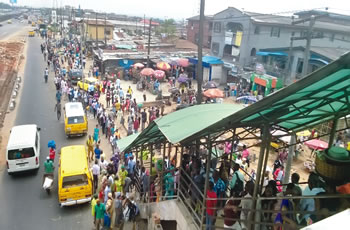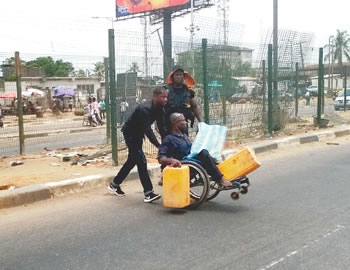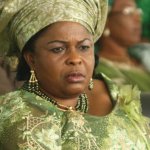In this report, TOLA ADENUBI, TUNDE DODONDAWA, AYOMIDE ODEKANYIN and NEWTON-RAY UKWUOMA bring the plights of people living with disabilities in Lagos to the fore, questioning the friendliness of the Lagos environment and its infrastructure to this category of people.
He sat under the scorching sun, explaining to passers-by how he came across the strange illness that deprived him of his precious limbs. Curiously, in spite of the state government’s warnings against street begging and trading, Adamu was ready to damn the consequence and keep on doing the ‘art’.
“If I don’t make efforts to come out and do this type of thing, I will definitely die of hunger indoors. The society does not care, even your kinsmen are ready to dump you at the slightest excuse,” he stated, while responding to Saturday Tribune’s query on why he opted for begging as his livelihood.
Ibrahim Mustapha, another individual living with disability in Lagos, has also been surviving on stipends and support he gets from the people of Lagos.
“It is frustrating living in this part of the world, when you see what others in this condition are enjoying in other parts of the world. Though the present governor of the state is constructing some bridges which I learnt will accommodate people like me, but if you check very well, you will realise that many of the existing pedestrian bridges are not suitable for us, physically-challenged.
“For instance, I need two able-bodied men to lift me and need another one to carry my wheelchair whenever I want to cross the highway. This is simply because our conditions were not factored in when most of these infrastructures were being constructed,” he argued.
While urging the state government to do more by ensuring that corporate organisations comply with its policy on people living with disabilities, Mustapha expressed the belief that things must change before the handicapped could begin to enjoy the state.
According to him, “I learnt there is a law that mandates corporate organisations to provide special walkway for us, but most banks in Lagos State do not comply. If you go to banks, insurance companies, pension fund administrators, religious institutions and so on, you will see near zero level of compliance.
“The present governor of Lagos State is constructing some bridges which I learnt will accommodate people like me, but if you check, most pedestrian bridges around are not built in such a way that we can use them without hassles,” he stated.
Mr Danlami Umaru Basharu, Nigeria’s representative to the United Nations Committee on the Rights of Persons Living with Disability, told Saturday Tribune that equal access to public facilities by every citizen should be the priority of any city, especially one aiming for the megacity status.
“Lagos State has an estimated two million people living with disabilities, most of whom cannot independently access public services such as commercial buses, roads, bridges and shops. Lagos can only become a mega city when it is accessible to all persons.”
“Will wheelchair users be able to use the roads? Will the blind people be able to manoeuvre their ways around the street independently? Are we going to have automated doors in shops? For Lagos to become a megacity, it has to live up to the name, and the most important thing about megacities is accessibility to facilities by all persons.
“Most of our roads are strewn with obstacles, open drains, gutters; people park their cars anyhow; you have signposts all over the road, all of which make walking independently very difficult. Most of our cities are not really conducive for people living with disability, especially wheelchair users and the blind,” he argued.
Basharu, who is also the President of Joint National Association of Persons Living with Disabilities, added: “For any person living with disability to engage in independent mobility, government needs to ensure that the roads are cleared of obstacles, drains are covered and roadside markets are controlled.
“All bridges should be made accessible. When they are constructing the bridges, consideration should be made for people living with disabilities. Instead of steps, we should have more of sliding bridges. No wheelchair user will be able to use bridges with steps. Government should make efforts to ensure that all pedestrian bridges have sliding ones so that people in wheelchair can access the bridges as other people.”
Interestingly, many Lagosians would quickly concur with the arguments put up by Adamu and others above. A visit to some public facilities in the city by Saturday Tribune revealed that in spite of the state government’s efforts at running an all-inclusive government, it cannot be said to be uhuru yet for the over three million people living with disabilities in the city.
For instance, ascending the pedestrian bridge in Ojota is likened to climbing Kilimanjaro, the highest mountain in Africa.
Speaking on the difficulty the residents face in accessing the bridge, Bolaji, a businessman whose office is situated close to the bridge, said, “Even for some of us who are not physically challenged, using that particular bridge is quite a task.”
Given options, Bolaji said he would avoid using such a “strenuous” bridge.
Perhaps to further worsen the situation, barricades are currently being erected between the lanes to compel the people, apparently including those living with disabilities, to make use of the controversial pedestrian bridge.
In his remarks, another physically-challenged individual identified as Taiwo Olopade called for the reconstruction of some buildings that serve as offices for corporate organisations which, he said, have failed in factoring the physically-challenged in all the facilities provided for public use.
He stressed how difficult it is for him to enter most banking halls due to the nature of their doors. In most cases, he said he sends someone to help him out anytime he has anything to do in a bank.
“For instance, if you are physically challenged and you want to go into a banking hall, you will really suffer because the facilities provided are usually difficult for the physically-challenged, especially those in wheelchair, to use.
“The question is: how does somebody in a wheelchair enter a banking hall with the current entry/exit system being used by most banks?” he queried.
It was also discovered that many of the high-rise buildings in Lagos, especially those built many years ago, are a no-go area for the physically challenged.
Saturday Tribune’s checks at some high-rise buildings in Apapa and other parts of Lagos revealed that many of the edifices lack facilities to accommodate the physically-challenged, especially as regards going to the higher floors.
In the words of a property consultant, Kayode Ejiro, these properties were built long ago and that is why it is very difficult for the physically-challenged to even think of venturing to such properties’ high floors.
“Except in Abuja where building projects have started taking into consideration the plight of the physically-challenged, many high-rise buildings in Lagos lack the facilities to help this group of people.
“They cannot use the elevator because they will need somebody to push them in and the person will also have to be on ground to help them out of such lifts. But as you know, Lagosians are always in a hurry, so who is going to help these people go all the way up the high-rise buildings? That is the problem many of them face and that is why you will not see a physically-challenged person coming into the elevator with you in Lagos. It is not something you see frequently,” Ejiro explained.
A legal practitioner, Mr Okunola Semilore, pointed out that it was high time the Nigerian government began to take the plights of the disabled in the society into consideration.
Also, taking a critical look at the infamous pedestrian bridge at Ojota, Semilore asked, “How does the government expect a disabled person to climb that bridge? It is, however, heartening to know that this present administration is taking into cognisance the plight of the underprivileged and the physically-challenged in its programmes, as most of the new pedestrian bridges being constructed are friendly to the disabled,” he said.
He added that under the law, disabled people also have rights and it is high time the government took that into consideration.
“The situation is quite different in the developed world. Disabled people have rights and the government ensures that their rights are not trampled on,” he stated.
But as indicting as these claims may be on the government of the day, evidence abound that the new government in the state is unrelenting in the task of making life worth living for the physically-challenged in the city.
For instance, the creation of the Lagos State Office of Disability Affairs (LASODA) is seen in many quarters as one of the steps being taken to address some of those challenges faced by the physically challenged in the state.
Besides, the launch of the N500 million disability funds by the incumbent governor of the state, Mr Akinwumi Ambode, to address the challenges confronting people with disabilities has also been described by many as a demonstration of the fact that the state government is beginning to take the plight of this class of people seriously.
While speaking on this issue recently, the General Manager of LASODA, Babatunde Awelenje, insisted that the state government was taking the physically-challenged into consideration while formulating its policies.
According to him, the N500 million disability funds provided by the state government are meant to enhance access to social infrastructure for the People living With Disabilities (PWDs).
He explained that besides the funds, the state government had also created a special parking space for PWD and a ramp at the entrance of every public building to enable the physically challenged person have access to such buildings.
Awelenje, however, appealed to those living with disabilities in the state to come and register with the state, noting that information was needed to enable the government plan adequately for them, especially in the areas of scholarships and establishment of schools and vocational centres.







